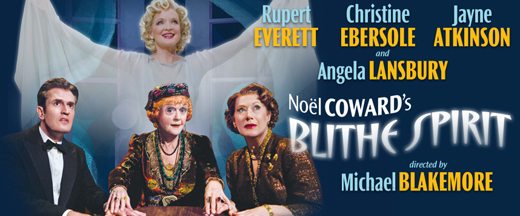Theatre
Blithe Spirit
21 May 2009 (Shubert Theatre)

Noël Coward's 1941 masterpiece is a malleable property: in David Lean's film adaptation as in the 1987 revival, which I saw but to my shame remember only very partially, the partial part being Richard Chamberlain, of all actors; the forgotten actresses being (O shame!) Blythe Danner, Judith Ivey, and Geraldine Page the man of the house, Charles Condamine winds up on his wives' arms dead.
That's not how the current production ends, I'm happy to say. It would have violated my sense of poetic injustice to deny Rupert Everett's anti-hero the escape from connubiality that he will enjoy to the hilt indefinitely until, that is, he tires of dealing directly with the servants. Mr Everett's Charles is marvelously unlikable: self-centered, childish, and surprisingly ungenerous altogether a petulant monster on the loose from Oscar Wilde. When his wives complain about him, you sense that they are not exaggerating. Mr Everett stops just short of being a stage villain, which nicely balances Angela Lansbury's stopping just short of being a Broadway legend right before your very eyes. Without Mr Everett's malice, this revival, directed by Michael Blakemore, would float off into the theatrical empyrean, remembered only as a festival production mounted in honor of a divinely gifted octogenarian.
I must stop right here to mention Ms Lansbury's antic terpsichorization of Madame Arcati's pre-trance ritual. I cannot describe it, except to say that it combines elements of Nijinski's Faun with a baseball pitcher's wind-up, and and that it seems to be set to an ethereal rendition, that only the psychic can hear, of "There Are Fairies at the Bottom of Our Garden." It is the most genuinely loony thing that I have ever seen in a theatre. Thanks to costume designer Mark Pakledinaz, Ms Lansbury wears a boffo outfit to match.
You will think that I must have been disappointed by Jayne Atkinson (Ruth) and Christine Ebersole (Elvira), to neglect mentioning them until now. But I was not disappointed. I couldn't take my eyes off Ms Atkinson whenever she was onstage; I couldn't resist the feeling that she was a ghost from the past the ghost of Gertrude Lawrence. Coward's favorite co-star doesn't seem to have played the part, and I would have been too young to be taken to see it if she had, but Ms Atkinson was certainly channeling somebody, and it wasn't just Norma Shearer. Ruth is a difficult role to pull off, because she is the only entirely sane person on the stage, and this can give her the sour breath of a party-pooper exactly what she is in the eyes of her revenant predecessor, the dead Elvira. For charm's sake, Ruth has to be majestically glamorous, like one of those reliable liners the Aquitania, the Berengaria that nobody remembers anymore because they steered, through decades of first-class service, clear of icebergs. In short: just the way that Ms Atkinson plays her. Charles may have had a lot of fun with Elvira, but he has matured, and now prefers comfort. Ms Atkinson's Ruth will get you where you want to go, and in style.
The only thing that keeps Elvira from being an impossibly annoying bore is her status as a dead person. She can still wreak havoc, of course, but she can't have what she wants, which is the pleasure of her husband's company in the afterworld. Ms Ebersole put the full range of this slippery character's wiles on display, from kewpie cuteness to sullen sarcasm. I found myself asking how familiar Coward might must! have been with the works of Thorne Smith, author of Topper. Miss Ebersole's Elvira is a cocktail that you know you oughtn't to drink, and that you later regret having drunk.
In the smaller parts, Simon Jones makes a burly, agreeable doctor, and Deborah Rush (of whom I can never see enough) has a lot of inverted fun as his wife, feeding straight lines to Ms Lansbury and prompting exemplary withering looks. As Edith, the new housemaid in keeping with the traditions of fine farce, she the first character to appear Susan Louise O'Connor shows us just how dependent upon Ruth Charles really is. Peter Davison's set authentically combines handsome architecture with routine furniture, and I must compliment Brian McDevitt for lighting Ruth's scene with Madame Arcati as if the opposite (unseen) end of the drawing room had two tall windows. It's a wonderful way of lowering the temperature a bit for the sensible beginning of a scene that goes comically awry.
There aren't very many comedies in the world that ask as many of the big questions as Blithe Spirit Why marriage? Is death boring? while observing the tact to essay answering none of them. (May 2009)
Copyright (c) 2009 Pourover Press